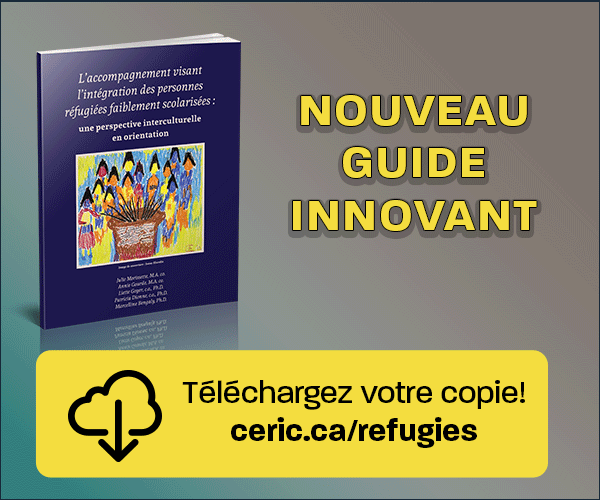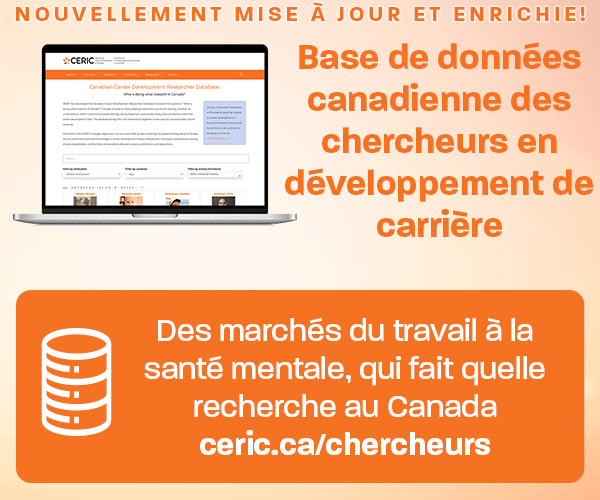Les conseillers et conseillères d’orientation professionnelle des écoles secondaires de langue française en Ontario : leurs tâches actuelles et leur perception de leurs compétences
Mots-clés :
career and guidance counsellors, perception of incompetence, training of career and guidance counsellorsRésumé
In a North-American context, the practice of career and guidance counselling is plagued with many issues depending on jurisdiction. Usually those issues are related to the fact that career and guidance counsellors are obliged to engage in practices that are not always related to their profession. Considering the fact that career and guidance counsellors in Ontario are mainly teachers with little formal education and no clinical training, the current study’s objective was to identify, describe, and conceptualize the tasks accomplished by N = 73 career and guidance counsellors working in French-language secondary schools in Ontario. Results suggest that career and guidance counsellors in Ontario spend a great deal of time on tasks unrelated to career and guidance counselling. Furthermore, a correlation between the amount of time allocated to, and the perceived level of competence in, completing some of the daily tasks accomplished by participants was identified. Finally, results suggest that career and guidance counsellors in Ontario often perceive themselves as being incompetent when it comes to some of the essential tasks associated with career and guidance counselling.
Références
Bardhoshi, G., & Duncan, K. (2009). Rural school principals’ perceptions of the school counselor’s role. The Rural Educator, 30(3), 16–24.
Bertrand, F., Peters, S., Pérée, F., & Hansez, I. (2010). Facteurs d’insatisfaction incitant au départ et intention de quitter le travail: Analyse comparative des groups d’âges. Le Travail Humain, 73(3), 213–237. doi:10.3917/th.733.0213.
Brace, N., Kemp, R., & Snelgar, R. (2013). SPSS for psychologists (5th ed.). New York, NY: Routledge.
Brott, P. E., & Myers, J. E. (1999). Development of professional school counselor identity. Professional School Counselling, 2(5), 339–348.
Dietsche, P. (2013). Career planning in Ontario grade 10 students: Counsellor perspectives. The Canadian Journal of Career Development/Revue Canadienne de Développement de carrière, 12(1), 4–16.
Foster, S. (2010). The relationship between professional identity and collective self esteem in school counselors. Unpublished doctoral dissertation, University of New Orleans, Louisiana, United States.
International Association for Educational and Vocational Guidance. (1999). Credential Educational and vocational guidance practitioner (EVGP).
International Association for Educational and Vocational Guidance. (2004). International competencies for educational and vocational guidance practitioners.
Keats, P. A., & Laitsch, D. (2010). Contemplating regulation of counsellors in Canadian schools: Current issues and concerns. Canadian Journal of Educational Administration and Policy,108, 1–33.
Monteiro-Leitner, J., Asner-Milde, K., Leitner, C., & Skelton, D. (2006). The Role of the Rural School Counselor: Counselor, Counselor-in-Training, and Perceptions. Professional School Counselling, 9(3), 248–251.
Mustaine, B. L., & Pappalardo, S. (1996). The discrepancy between actual and preferred time on task for Ontario school counsellors. Guidance & Counselling, 11(2), 32–35.
Nadon, D., Samson, A., Gazzola, N., & Thériault, A. (2016). Becoming a guidance counsellor in Ontario: formative influences from counsellors’ perspective. International Journal for Educational and Vocational Guidance, 16(3), 363–377. doi: 10.1007/s10775-015-9317-3.
Ontario College of Teachers. (2014). Additional qualification course guideline, guidance and career education: Part 1. Toronto, ON.
Ontario Ministry of Education. (2013). Creating pathways to success - An education and career/life planning program for ontario schools, policy and program requirements, kindergarten to grade 12.
Organization for Economic Co-operation and Development. (2002). OECD review of career guidance policies: Country note.
Organization for Economic Co-operation and Development. (2004). Career guidance and public policy: Bridging the gap.
Sears, S.J., and Granello, D.H. (2002). School counselling now and in the future: A reaction. Professional School Counselling, 5(3), 164-171.
Sovet, L., DiMillo, J., & Samson, A. (2016). Linguistic identity and career decision-making difficulties among French-speaking Canadian students living in an Anglo-dominant context. International Journal For Educational and Vocational Guidance, 16(3), 363–377. doi:0.1007/s10775-016-9328-8.
Viviers, S. (2016). Souffrance et stratégies défensives dans le travail de conseillers d’orientation en milieu scolaire: l’identité professionnelle en question. In G. Fournier, L. Lachance et E. Poirel (dir.), Éducation et vie au travail: diversité des trajectoires professionnelles et dynamique de maintien durable en emploi (pp. 253-293), Québec, Presses de l’Université Laval.
Yim, O., & Ramdeen, K. T. (2015). Hierarchical cluster analysis: Comparison of three linkage measures and application to psychological data. The Quantitative Methods for Psychology, 11(1), 8–21. doi:10.20982/tqmp.11.1.p008.

Téléchargements
Publié-e
Comment citer
Numéro
Rubrique
Licence
(c) Tous droits réservés La Revue canadienne de développement de carrière 2020

Cette œuvre est sous licence Creative Commons Attribution - Pas d'Utilisation Commerciale - Pas de Modification 4.0 International.











